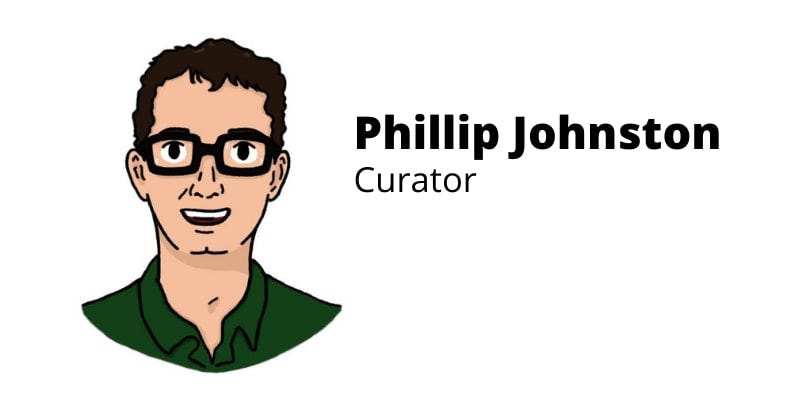Reality as a Game, Gen Z Sex Talk, and Why You Shouldn't Throw Away Your Stuff
Plus, is God hopeful?
Join us for a four-session course on why people are deconstructing their Christian faith. We will look at stories from the experiences of those who are deconstructing; we’ll try to put religious disaffiliation in a larger cultural context; and consider what, if anything, can be said or done to shore up the viability of Christianity for those who are in the grip of a deconversion.
Don’t Go Digital. Objects Stabilize Life
L.M. Sacasas on materiality and the self
Why keep things? It’s a question we all face in a time when photographs, movies, documents, music, and books can all be uploaded to the cloud. We can access everything 24/7, but it’s also easy to feel like we’ve lost something.
That’s because we have, writes L.M. Sacasas. Material objects stabilize our life and anchor our identity. Without them, we quickly lose touch with who we are. Take a physical book as an example:
I remember where I was when I read it. Or I recall who gave it to me or to whom I have lent it. In other words, the presence of the book on a shelf recalls its contents to mind at a glance and also intertwines an assortment of memories into the backdrop of my day-to-day life. At the very least, it becomes an always available potential portal into my past.
Not so with digital devices, which have a tendency to “over-consolidate” material things “in a way that smooths out the texture of our experience.” This happens all the time in the digital age and could be a source of our fleeting sense of life.
Read The Stuff of Life: Materiality and the Self over at The Convivial Society. In a similar vein, see Alan Jacobs’ recent declaration that You’re Exhausted Because You Don’t Have Enough to Do.
Why We Can’t Agree on What is Real
Jon Askonas on what happened to consensus reality
What do conspiracy theories like QAnon have in common with Alternate Reality Games (ARGs)? According to game designers and writer Jon Askonas, quite a lot, actually.
Both incentivize forming dense, digital communities around shared theories and secrets.
Both mix a sense of anxiety with the thrill of "putting it all together."
Both foster diverging narratives generated by myriad interpretations of reality that may nor may not be true, may or may not be "clues."
In the games and in reality, speculations slowly harden into facts, not because they correspond to what is real, but because the "player" wants to believe them.
Askonas makes a cutting comparison to how our entire online discourse, not simply conspiracy theories, mirror the dynamics of a game. Like an ARG, our life online is “not about establishing the facts within consensus reality.” It is now “about finding the most compelling model of reality for a given group.”
So, the proliferation of conspiracy theories in our time might just be another example of the internet providing society with a series of mirrors that it thinks are windows. The feeling of diving deeper down a rabbit trail of digital "facts" online is one of uncovering an alternate reality, but actually, you are only partaking in one of the new internet's most enticing functions: to show us more of what we want to see.
Read Reality is Just a Game Now over at The New Atlantis.
Teaching Gen Z About Sex
Andrew Bunt on lessons from a week of ‘Sex Questions’
Andrew Bunt just spent a week running a ‘Sex Questions’ seminar at NewDay, an annual youth event put on by Newfrontiers in the UK. The goal was “to help young people to ask, discuss and wrestle with some of the big questions we all have about sex and relationships.”
Of the many things he learned from teaching five sessions, this one came as a surprise:
I expected the majority of young people coming to the seminars to have views strongly shaped by a secular sexual ethic. Many of them do seem to have been shaped by that ethic, but the questions and conversations across the week revealed a broader range of perspectives than I expected. Some young people did seem highly influenced by our secular culture, but some seemed to be at the other end of the spectrum with very conservative (and I’d say equally unbiblical) beliefs such as that the very experience of same-sex attraction is something for which we incur guilt before God. There were also young people somewhere in the middle whose main concern was how to love their gay friends well and how not to come across as homophobic.
Read more Lessons From a Week Teaching Teenagers About Sex or listen to the sessions over at ThinkTheology.
Hope is hard to come by, but everyone needs it. In our previous issue, we pointed to an article by theologian Peter Leithart called Radical Hope. “We need hope to live virtuously,” Leithart writes, “to act with courage and patience; we need hope to act at all.” But how can we do this when the world feels like it’s coming to an end?
For Christians, the key is realising that we worship “the God of hope” (Romans 15:13). This is the theme of Leithart’s new book, God of Hope. Two facets stand out.
First, Leithart presents hope as a virtue of God himself. This might sound strange. If God knows the future, what does he have to hope for? Leithart gets there in a thrilling way. He begins with Paul’s famous words in 1 Corinthians 13: “And now these three remain: faith, hope and love.” We know that God is a Trinity of love, but is he also faith and hope?
Indeed. He is faith in that he is “a three-Personed communion of faithful, loyal allegiant ones.” And he is hope because these faithful persons are ever waiting upon one another — and hope is all about waiting.
The Triune God reveals Himself as the mutual hope of Father for Son and Son for Father. As the Spirit is the personal Love that binds Father and Son, so the Spirit is the mutual Hope by which Father and Son wait for one another. By the Spirit the Father groans in expectation of His Son’s faithful obedience; is the same Spirit, the Son hopes for the glory promised by His Father.
The second standout quality is the way in which Leithart’s picture of Christian hope is grounded in a postmillennial vision of the future. That is, he believes that most of what the New Testament records about “the end of the age” happened around 70 AD when the Jerusalem temple was flattened by Rome:
It marked the end of the old world and the beginning of a new one. We live in that new world, and so we hope for the very things the prophets prophesy: the extension of Abraham's blessing to all the families of the earth, the rise of Zion to become the chief of the mountains, the spread of the Lord’s word to the nations, peace and reconciliation among enemies, the saints raised to thrones. … If we expect less, we expect too little of the God of hope.
This is a minority viewpoint; you might not agree. But if your expectations of the end leave you more scared than hopeful, Leithart’s rich and multifaceted vision of Christian hope might make for a refreshing tonic.
At a recent church event, Phillip met a Three Things reader who recognised him solely from the avatar above (here’s looking at you, Dan). A needful reminder that people actually read this, something Andy also tried to impress upon Phillip at their recent 3T summit (i.e. Phillip and Andy going for coffee).
Reading: Phillip and Christa are slowly reading and talking through Habits of the Household. It is a deeply rooted, creative, patient, inspiring book that anyone would benefit from. He’s also reading Abigail Favale’s The Genesis of Gender: A Christian Theory after listening to an interview on Girlboss, Interrupted. It is masterful and might just be his book of the year.
Listening: On the BBC Proms last week, Aurora Orchestra performed Beethoven’s Fifth from memory. Truly outstanding and prefaced by a joyful, entertaining walkthrough. He also loves watching his girls dance to Peter Gregson’s new arrangement Gigue 6.6 from Bach’s cello suites.
Andy recently returned from a trip to England for the Rabbit Room’s Hutchmoot UK conference and a trip to visit English L’Abri. It was good to be back in the land where 90 degrees Fahrenheit is a heat wave, roads are tiny but hedges are big, and Brits sell their old stuff out of the back of their cars every weekend (look it up, America).
Reading: Andy was fascinated by a Mckinsey study on the “Great Resignation” which showed that two out of every five employees globally are currently thinking of leaving their jobs in the next 3-6 months.
Working on: Andy is chipping away at translating the Psalms (see below), preparing for the Three Things course on why people are leaving Christianity, and rearranging the material on deconstruction from Still Point for an upcoming conference at the Francis Schaeffer Institute in September.
Darkling Psalter: A new post for Andy’s project to create poetic renditions of the Hebrew paired with commentary and a new poem: Psalm 147—Inside the Losing, You Hid Another Life.













